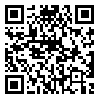Volume 31, Issue 4 (1-2023)
JGUMS 2023, 31(4): 338-349 |
Back to browse issues page
Research code: IR.GUMS.REC.1400.039
Ethics code: IR.GUMS.REC.1400.039
Download citation:
BibTeX | RIS | EndNote | Medlars | ProCite | Reference Manager | RefWorks
Send citation to:



BibTeX | RIS | EndNote | Medlars | ProCite | Reference Manager | RefWorks
Send citation to:
Baradaran M, Mirzaei Malati M, Etemadifar R, Kouchak Asaadi S, Parsamehr N. Post-Traumatic Stress Disorder, Anxiety Sensitivity, and Resilience Among Hospital Medical Staff in Rasht, During the COVID-19 Pandemic. JGUMS 2023; 31 (4) :338-349
URL: http://journal.gums.ac.ir/article-1-2509-en.html
URL: http://journal.gums.ac.ir/article-1-2509-en.html
Majid Baradaran1 

 , Maedeh Mirzaei Malati *
, Maedeh Mirzaei Malati * 

 2, Roghayeh Etemadifar3
2, Roghayeh Etemadifar3 

 , Samaneh Kouchak Asaadi4
, Samaneh Kouchak Asaadi4 

 , Nasrin Parsamehr5
, Nasrin Parsamehr5 




 , Maedeh Mirzaei Malati *
, Maedeh Mirzaei Malati * 

 2, Roghayeh Etemadifar3
2, Roghayeh Etemadifar3 

 , Samaneh Kouchak Asaadi4
, Samaneh Kouchak Asaadi4 

 , Nasrin Parsamehr5
, Nasrin Parsamehr5 


1- Department of Psychology, Faculty of Educational and Psychology, Payame Noor University, Tehran, Iran.
2- Department of Clinical Psychology, Faculty of Humanities, Lahijan Branch, Islamic Azad University, Lahijan, Iran. , maedeh.mirzaee@yahoo.com
3- Vice Chancellor for Management Development, Resources and Planning, Guilan University of Medical Sciences, Rasht, Iran.
4- Department of Clinical Psychology, Faculty of Humanities, Lahijan Branch, Islamic Azad University, Lahijan, Iran.
5- Department of Pure Psychology, Faculty of Humanities, Payame Noor University, Amlash, Iran
2- Department of Clinical Psychology, Faculty of Humanities, Lahijan Branch, Islamic Azad University, Lahijan, Iran. , maedeh.mirzaee@yahoo.com
3- Vice Chancellor for Management Development, Resources and Planning, Guilan University of Medical Sciences, Rasht, Iran.
4- Department of Clinical Psychology, Faculty of Humanities, Lahijan Branch, Islamic Azad University, Lahijan, Iran.
5- Department of Pure Psychology, Faculty of Humanities, Payame Noor University, Amlash, Iran
Abstract: (690 Views)
Background The coronavirus disease 2019 (COVID-19) pandemic has extensively affected the public physical and mental health, especially the medical staff working in the COVID-19 wards of hospitals.
Objective This study aims to evaluate the relationship between post-traumatic stress disorder (PTSD), anxiety sensitivity (AS), and resilience among hospital medical staff in Rasht, during the COVID-19 pandemic.
Methods This is an analytical cross-sectional study. The study population consists of all medical staff working in the COVID-19 wards of Poursina and Razi hospitals in Rasht, Iran. Of these, 94 participated who were selected using a convenience sampling method. Weathers et al.’s post-traumatic stress disorder checklist, Reiss et al.’s AS index, and Connor-Davidson resilience scale were used for data collection. The data were analyzed using Pearson correlation test and multiple linear regression analysis.
Results There was a significant negative correlation between PTSD and resilience (r=-0.405, P=0.001). and a significant positive correlation between PTSD and AS (r=0.633, P=0.001). The results of multiple analyses showed that resilience (B=-0.208, P=0.004) and AS (B=0.574, P=0.001) could significantly explain the PTSD in medical staff.
Conclusion Resilience can be an important protective factor against PTSD in hospital medical staff during the COVID-19 pandemic. The medial staff with AS may experience the symptoms of PTSD more.
Objective This study aims to evaluate the relationship between post-traumatic stress disorder (PTSD), anxiety sensitivity (AS), and resilience among hospital medical staff in Rasht, during the COVID-19 pandemic.
Methods This is an analytical cross-sectional study. The study population consists of all medical staff working in the COVID-19 wards of Poursina and Razi hospitals in Rasht, Iran. Of these, 94 participated who were selected using a convenience sampling method. Weathers et al.’s post-traumatic stress disorder checklist, Reiss et al.’s AS index, and Connor-Davidson resilience scale were used for data collection. The data were analyzed using Pearson correlation test and multiple linear regression analysis.
Results There was a significant negative correlation between PTSD and resilience (r=-0.405, P=0.001). and a significant positive correlation between PTSD and AS (r=0.633, P=0.001). The results of multiple analyses showed that resilience (B=-0.208, P=0.004) and AS (B=0.574, P=0.001) could significantly explain the PTSD in medical staff.
Conclusion Resilience can be an important protective factor against PTSD in hospital medical staff during the COVID-19 pandemic. The medial staff with AS may experience the symptoms of PTSD more.
Review Paper: Research |
Subject:
Special
Received: 2022/06/13 | Accepted: 2022/09/4 | Published: 2022/11/16
Received: 2022/06/13 | Accepted: 2022/09/4 | Published: 2022/11/16
| Rights and permissions | |
 | This work is licensed under a Creative Commons Attribution-NonCommercial 4.0 International License. |






